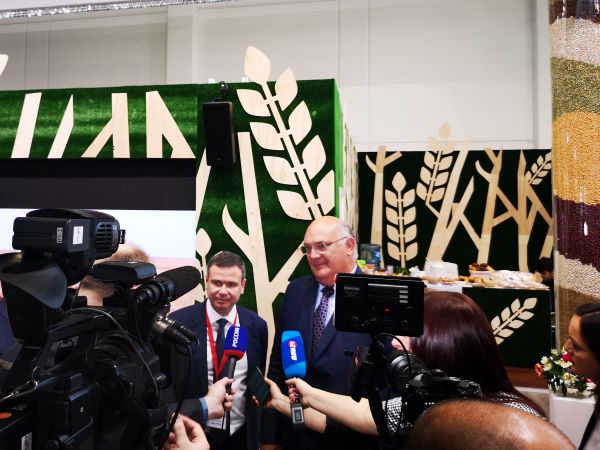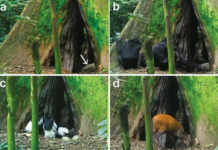Theo de Jager (right) Russian television interview in Berlin
South Africa : Saai – an organisation that protects the interests of family farmers – submitted commentary on the amendment to the Constitution that would allow for expropriation without compensation.
Saai is planning a strong international awareness campaign for 2020 on expropriation without compensation and farm murders. The first leg of the campaign comprised a visit to the Hungarian government and the Global Forum for Food and Agriculture (GFFA) held in Berlin, Germany. Almost 80 countries’ ministers of agriculture were present, and Dr Theo de Jager, Chairperson of Saai’s Board of Directors and President of the World Farmers Organisation, had to answer many questions about the South African expropriation issue. South Africa’s Minister and Deputy Minister of Agriculture, Land reform and Rural Development did not attend the meeting that was held with other ministers.
“There is major cynicism on why the Constitution needs to change. Thanks to the Motlanthe Report and the evidence from the Zondo Commission the world knows that the greatest hurdle in land reform remains capacity shortage and corruption in the Department. At the myriad of meetings that I attended at the World Economic Forum in Davos people talked openly about state capture and especially the lack of prosecution of implicated people with political connections,” De Jager says.
“In the eyes of foreign governments and investors, the ANCs drive for expropriation without compensation is but an extension of a culture of state pillage, nepotism and other offences under the ruling elite. They view South Africa as an investment risk,” De Jager continues.
Saai is opposed to any changes to the Constitution that would allow for expropriation without compensation. The commentary that it submitted focuses on the international legal aspect and matter of zero compensation. The Universal Declaration of Human Rights (1948) and various other international treaties such as the African Charter on Human and People’s Rights (1986) and the European Convention on Human Rights Protocol (1953) both acknowledge the right to property, as well as the fact that property may be expropriated under certain conditions. Expropriation of property is always subject to certain conditions, however. One of these is the payment of fair and reasonable compensation.
According to the ANC, the purpose of the amendment to the Constitution is to make explicit that which is implicit. Saai’s request is that South Africa commits itself to the principles of the Universal Declaration of Human Rights, as well as to the principles included in its commercial agreements. Saai also requests that the Constitution should pertinently specify that it cannot be expected of one person to carry the cost of a national responsibility.
Saai is inundated with queries from abroad about the ANC’s decision to avoid the courts in the process and to give the executive authority the power to determine compensation payable. Minister Thoko Didiza had to abandon the same idea in 2008 when it was then found it would have been unconstitutional. There are few elements of the debate that deter investors more than this proposal, and it comes at a time when South Africa’s economy cannot afford it.
The nature of Saai’s commentary on the amendment to the Constitution will also be a central component in the legal action to be launched if the amendment were to go ahead.









